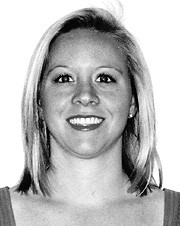
Dying young
At the age of 25, my life changed forever. My twin sister, Whitney, died on Oct. 13, 2002, when her heart stopped beating. She did not have heart disease or a previous heart condition. Whitney died because she struggled with both bulimia and anorexia for over 10 years. She finally lost the fight.
This disease is not glamorous. In her 10-year struggle with it, Whitney spent most of them in one form of therapy or another. She was in two eating disorder hospitals, and, in fact, the week before she died, Whitney was in the hospital being pumped with fluids to bring her electrolytes back to a normal level.
Her eating disorder also caused her to suffer from a skin disease that is normally only found in third world countries where malnourishment is common.
There are no clear answers for recovery. Many people with eating disorders are dealing with great physical and mental pain.
I had a hard time sleeping after Whitney died. I would lie awake thinking of the suffering she endured while here on Earth, and how painful it must be to feel that you have no one to turn to. Not even your twin sister.
My wish for those who read this is two-fold. First, for those suffering with an eating disorder, please get help and be aware that your future may be cut short if you don’t. Whitney knew her life was threatened and her body was suffering, but she never imagined her life would end because of her eating disorder. Living with an eating disorder is like continuously living in danger.
Second, please realize that an eating disorder is a disease. It’s not something a person does to get attention. It is not about how a person looks on the outside, but more about how they feel on the inside. Eating disorders are about trying to have control in a world that they feel is uncontrollable.
Why should anyone die at the age of 25? Whitney was an amazing woman with incredible dreams, but like many other men and women who suffer from eating disorders, she will never realize them.
If you are suffering or know someone that is suffering from an eating disorder, please contact the Mental Health Services Department at the SMU Student Health Center at 214-768-2860.
You can also find out more about eating disorders at www.nationaleatingdisorders.org or www.somethingfishy.org.








